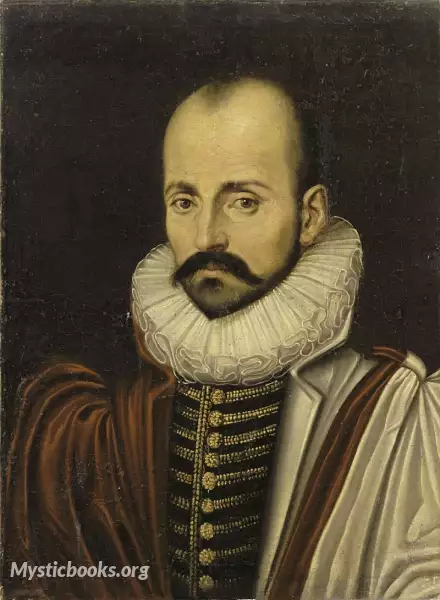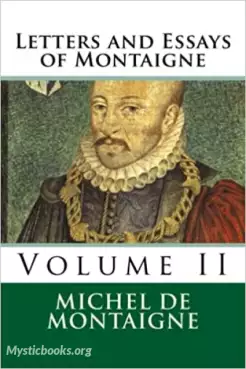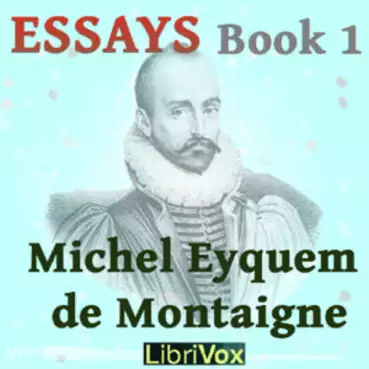
Timeline
Title
Country/Nationality
Michel de Montaigne
Michel Eyquem de Montaigne also known as Lord of Montaigne, was one of the most significant philosophers of the French Renaissance. He is known for popularizing the essay as a literary genre. His work is noted for its merging of casual anecdotes and autobiography with intellectual insight. Montaigne had a direct influence on numerous Western writers; his massive volume Essais contains some of the most influential essays ever written.
During his lifetime, Montaigne was admired more as a statesman than as an author. The tendency in his essays to digress into anecdotes and personal ruminations was seen as detrimental to proper style rather than as an innovation, and his declaration that "I am myself the matter of my book" was viewed by his contemporaries as self-indulgent. In time, however, Montaigne came to be recognized as embodying, perhaps better than any other author of his time, the spirit of freely entertaining doubt that began to emerge at that time. He is most famously known for his skeptical remark, ''Que sçay-je?" ("What do I know?", in Middle French; now rendered as "Que sais-je?" in modern French).
Montaigne was born in the Aquitaine region of France, on the family estate Château de Montaigne in a town now called Saint-Michel-de-Montaigne, close to Bordeaux. The family was very wealthy; his great-grandfather, Ramon Felipe Eyquem, had made a fortune as a herring merchant and had bought the estate in 1477, thus becoming the Lord of Montaigne. His father, Pierre Eyquem, Seigneur of Montaigne, was a French Catholic soldier in Italy for a time and had also been the mayor of Bordeaux.
Although there were several families bearing the patronym "Eyquem" in Guyenne, his father's family is thought to have had some degree of Marrano (Spanish and Portuguese Jewish) origins, while his mother, Antoinette López de Villanueva, was a convert to Protestantism. His maternal grandfather, Pedro Lopez, from Zaragoza, was from a wealthy Marrano (Sephardic Jewish) family that had converted to Catholicism. His maternal grandmother, Honorette Dupuy, was from a Catholic family in Gascony, France.
During a great part of Montaigne's life, his mother lived near him and even survived him, but she is mentioned only twice in his essays. Montaigne's relationship with his father, however, is frequently reflected upon and discussed in his essays.
Montaigne's education began in early childhood and followed a pedagogical plan that his father had developed, refined by the advice of the latter's humanist friends. Soon after his birth, Montaigne was brought to a small cottage, where he lived the first three years of life in the sole company of a peasant family in order to, according to the elder Montaigne, "draw the boy close to the people, and to the life conditions of the people, who need our help". After these first spartan years, Montaigne was brought back to the château. Another objective was for Latin to become his first language.
The intellectual education of Montaigne was assigned to a German tutor (a doctor named Horstanus, who could not speak French). His father hired only servants who could speak Latin, and they also were given strict orders always to speak to the boy in Latin. The same rule applied to his mother, father, and servants, who were obliged to use only Latin words he employed, and thus they acquired a knowledge of the very language his tutor taught him. Montaigne's Latin education was accompanied by constant intellectual and spiritual stimulation. He was familiarized with Greek by a pedagogical method that employed games, conversation, and exercises of solitary meditation, rather than the more traditional books.
The atmosphere of the boy's upbringing, although designed by highly refined rules taken under advisement by his father, created in the boy's life the spirit of "liberty and delight" that he later would describe as making him "relish... duty by an unforced will, and of my own voluntary motion...without any severity or constraint"; yet he would have everything to take advantage of his freedom. And so a musician woke him every morning, playing one instrument or another, and an épinettier (with a zither) was the constant companion to Montaigne and his tutor, playing tunes to alleviate boredom and tiredness.
Around the year 1539, Montaigne was sent to study at a highly regarded boarding school in Bordeaux, the College of Guienne, then under the direction of the greatest Latin scholar of the era, George Buchanan, where he mastered the whole curriculum by his thirteenth year. He finished the first phase of his educational studies at the College of Guienne in 1546. He then began his study of law (his alma mater remains unknown since there are no certainties about his activity from 1546 to 1557) and entered a career in the local legal system. He was a counselor of the Court des Aides of Périgueux and, in 1557, he was appointed counselor of the Parlement in Bordeaux, a high court. From 1561 to 1563 he was courtier at the court of Charles IX and he was present with the king at the siege of Rouen (1562). He was awarded the highest honour of the French nobility, the collar of the Order of Saint Michael, something to which he had aspired from his youth.
Books by Michel de Montaigne

Essays: Book 2
Michel Eyquem de Montaigne is one of the most influential writers of the French Renaissance, known for popularising the essay as a literary genre. He is also known as the father of Modern Skepticism. His pieces became famous for his apparent effortle...

Essays: Book 1
The Essays of Michel de Montaigne are contained in three books and 107 chapters of varying length. They were originally written in Middle French and were originally published in the Kingdom of France. Montaigne's stated design in writing, publishing...